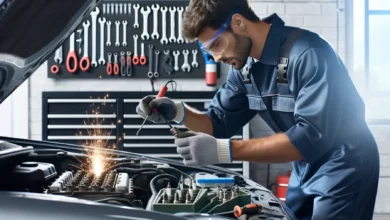Car Maintenance Average Cost Per Month: The Ultimate Guide
Sponsored Ads
Image Alt Text: 
Introduction
Keeping your car in good condition not only ensures its longevity but also keeps you and your family safe on the road. However, car maintenance can be expensive, and it’s important to budget for these costs accordingly. In this comprehensive guide, we’ll provide you with a detailed breakdown of the average car maintenance costs per month, including preventive maintenance, repairs, and unexpected expenses. By understanding these costs and implementing a proactive maintenance plan, you can keep your car running smoothly and avoid costly surprises down the road.
Section 1: Understanding the Factors that Affect Car Maintenance Costs
The cost of car maintenance can vary significantly depending on several factors, including:
–
Vehicle Make and Model: Different makes and models of cars have varying maintenance requirements and parts costs.
–
Mileage: As your car ages and accumulates miles, it will require more frequent and extensive maintenance.
–
Driving Habits: Aggressive driving or frequent towing can put additional wear and tear on your car, leading to increased maintenance costs.
Section 2: Average Car Maintenance Costs Per Month
On average, car owners in the United States spend around $82 per month on maintenance. However, this figure can vary depending on the factors mentioned above.
–
Preventive Maintenance: This includes regular oil changes, tire rotations, and inspections. These services are essential for keeping your car running smoothly and avoiding costly repairs. The average cost of preventive maintenance is around $50 per month.
–
Repairs: Unexpected repairs can be a significant expense, especially if they involve major components like the engine or transmission. The average cost of repairs is around $32 per month.
Section 3: Strengths and Weaknesses of Knowing Car Maintenance Average Cost Per Month
Strengths:
–
Budgeting: Knowing the average car maintenance cost per month allows you to plan and budget accordingly, avoiding financial surprises.
–
Proactive Maintenance: By understanding the potential costs, you can prioritize preventive maintenance, which can save money on repairs in the long run.
Weaknesses:
–
Estimates: The average cost per month is just an estimate, and actual costs may vary depending on your specific vehicle and circumstances.
–
Unexpected Expenses: Even with regular maintenance, unexpected repairs can still occur, which can strain your budget.
Section 4: Table of Car Maintenance Average Costs Per Month
| Service | Average Cost | Frequency |
|---|---|---|
| Oil Change | $30-$50 | Every 3-6 months |
| Tire Rotation | $20-$40 | Every 5,000-7,500 miles |
| Inspection | $50-$100 | Every 12 months or 15,000 miles |
| Brake Pads Replacement | $150-$300 | Every 20,000-30,000 miles |
| Battery Replacement | $100-$200 | Every 3-5 years |
Section 5: Frequently Asked Questions (FAQs)
1. What is the most expensive car maintenance cost?
Replacing a major component like the engine or transmission can cost thousands of dollars.
2. How can I reduce car maintenance costs?
Regular preventive maintenance, avoiding aggressive driving, and using quality parts can help reduce overall maintenance costs.
3. When should I get my car inspected?
It’s recommended to get a professional inspection at least once a year or every 15,000 miles.
4. What is the average lifespan of car tires?
Tires typically last between 30,000 and 50,000 miles, depending on driving habits and road conditions.
5. How often should I change my oil?
Consult your owner’s manual for the recommended oil change intervals, which typically range from every 3,000 to 7,500 miles.
6. What is a timing belt and how often should it be replaced?
A timing belt synchronizes the engine’s camshaft and crankshaft. It should be replaced according to the manufacturer’s recommended schedule, typically between 60,000 and 105,000 miles.
7. How can I find a reputable mechanic?
Look for mechanics who are certified by the National Institute for Automotive Service Excellence (ASE) and read online reviews from previous customers.
8. What is a catalytic converter and how often should it be replaced?
A catalytic converter reduces harmful emissions. It typically does not need to be replaced unless it fails or becomes damaged.
9. What is a spark plug and how often should it be replaced?
Spark plugs ignite the air-fuel mixture in the engine. They should be replaced every 30,000 to 60,000 miles.
10. What is a fuel filter and how often should it be replaced?
A fuel filter prevents contaminants from entering the fuel system. It should be replaced every 20,000 to 30,000 miles.
11. What is an air filter and how often should it be replaced?
An air filter cleans the air that enters the engine. It should be replaced every 12,000 to 15,000 miles.
12. What is a cabin air filter and how often should it be replaced?
A cabin air filter cleans the air inside the vehicle. It should be replaced every 12,000 to 15,000 miles.
13. What is a transmission fluid change and how often should it be performed?
Transmission fluid lubricates and protects the transmission. It should be changed every 30,000 to 60,000 miles.
Section 6: Conclusion
Understanding the average car maintenance cost per month is essential for responsible vehicle ownership. By budgeting for these costs and implementing a proactive maintenance plan, you can ensure that your car remains in good condition and you avoid unexpected financial surprises. Remember, regular maintenance not only saves money in the long run but also improves your car’s performance and safety.
Section 7: Action Steps
–
Create a Maintenance Plan: Establish a schedule for regular maintenance services like oil changes, tire rotations, and inspections.
–
Budget for Maintenance: Include the average car maintenance cost per month in your budget to avoid financial stress in the event of unexpected repairs.
–
Find a Reputable Mechanic: Trustworthy mechanics can provide accurate estimates and quality repairs, ensuring your car is in good hands.
–
Regularly Check Your Car: Pay attention to any unusual noises or vibrations, which could indicate potential issues.
–
Use Quality Parts: While cheap parts may seem economical, they can often lead to premature failure and increased maintenance costs.
Closing Words or Disclaimer
The information provided in this article is intended for informational purposes only and should not be considered financial advice. The actual car maintenance costs may vary depending on your specific vehicle, driving habits, and geographical location. It’s always recommended to consult with a qualified mechanic or car maintenance professional for personalized advice and repair recommendations.










